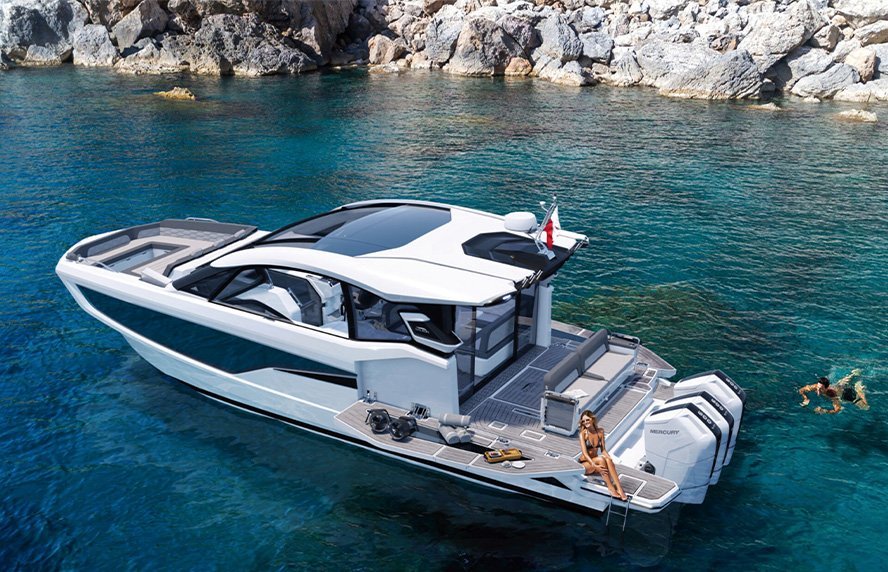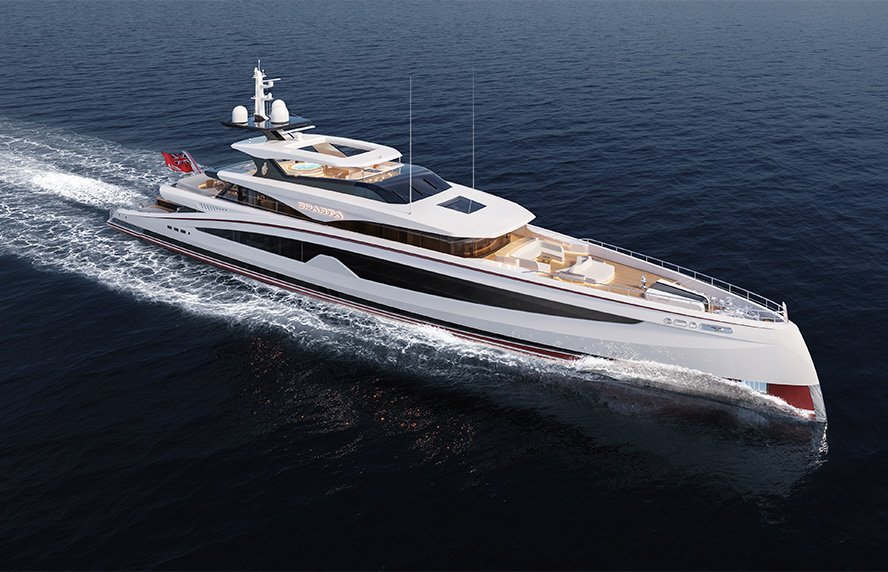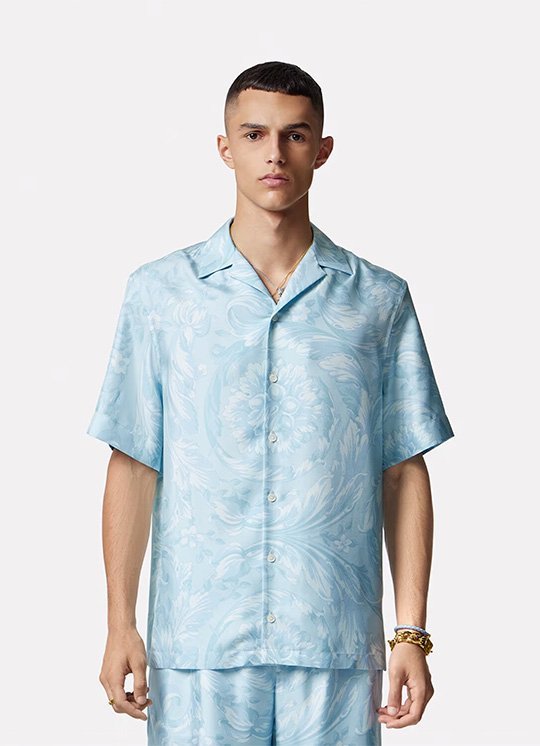
It could be said of the company that it is discreet, despite the 9000 square metres it occupies in Fânzeres, in Oporto. Those passing by, if they knew nothing about it, would never imagine the scope of it. The same can be said of Sérgio Neves, majority shareholder of JNF – a company whose main area of business is the production of fittings for furniture and construction, responding to the trends of contemporary architecture. But where’s the excitement, then? Because both the man and the space have a lot in common. No, this isn’t just a factory making hinges, handles and locks. It is a hive of innovation and development. Where state-of-the-art machines mingle with dynamic brains, hungry for more, for the best. Only the best. A story that (almost) only began with the pharmacist, who could not see himself spending his life behind a counter and decided to plant the idea of change in his father’s head. In fact, he is still like that today. Relaxed, but attentive. Simple, but aware of the importance of details. Sérgio Neves is spurred on by challenges. He is someone who rushes to see what is on the other side of the curtain. What are the trends? More than that, what are the solutions? Antimicrobial materials, eliminating chemical processes? Reducing the environmental footprint? Yes, but not only that. What is missing is beauty, the use of what is good and Portuguese, ceramics, cork. And why not also work with goldsmithing? You would never think that anyone arriving there announces themselves by ringing a small bell, would you? Surprising even in that.
How did JNF come about?
The company came about as an inheritance from my father’s stepfather. It dates back to before 1955. Then, my father founded his own company in 1965, linked to industry, in the centre of Oporto. The beginning of this business was with a level of fittings that has nothing to do with what is used today. We basically made piano hinges, very large one, two metres long, and our market was a national, domestic market. I started working for the company in 1968, I was 24 years old, after finishing my degree in Pharmacy. But I never saw myself behind a counter selling medicine and I thought I had more prospects of personal fulfilment by growing a small company, which I thought had a lot of potential. My father accepted the challenge, I joined the company and we started working almost from scratch. At the time, we had three employees. Today, we are 57.
How is such a journey made?
In various phases. The most fundamental and remarkable was in 1990. It was when I decided to approach what was being done in other countries and, then, I visited several international fairs and noticed that Portugal was very isolated relative to the rest of the world with regard to fittings. I started to look a little bit at what could be seen in other countries. I thought we had to link up with other companies, which had much more know how than us and forge some kind of partnerships, even if they were commercial partnerships, because this would bring a lot of value to the company in terms of knowledge, design and technology. So, we began to associate our industrial part with a commercial part, forging partnerships with Italian, Spanish and French companies.
Is this how the company’s internationalisation began?
Exactly. That border is worth mentioning because it represents no longer being a domestic company, limited to the national market. So, after we had entered into some commercial agreements, many of them with well-known companies, we began to give them more prominence in the national market. Since we began to work our product group together with other types of products, we found that we grew exponentially at a national level, because we didn’t offer just traditional fittings, we offered a very wide range that covered a market area that we were not used to touching. Then, another phase that is quite important is the year 2000, when we did our first international fair, as exhibitors. We began to exhibit at international fairs with our products, we created product ranges that became very much identified with us.
"We were an Iberian company, but we had a more Nordic language. I think that was the main reason we stood out from the rest”
How did the company stand out?
We focused on using materials and designs that were not very traditional. We started using a very minimalist design, inspired by the Nordic markets. We also started to use materials like those used in Nordic markets - more neutral, which don’t have many organic shapes, but more geometric shapes -, and I think that was one of the reasons why we stood out at the fairs. We were an Iberian company, but we had a more Nordic language. I think that was the main reason we stood out from the rest.
It was a risk...
It was risky, but the risk was always controlled. We always keptup a very close dialogue with our customers. We listened a lot to what they told us, what they needed, we were very much in tune with what they were asking of us. We were never a closed-off company, of the "this is what we produce, we’re not open to producing anything else” kind. There was always a lot of dialogue with the customer. And this communication has produced good results.
Where exactly can you see this response to customers’ needs? For the less attentive, JNF is a fittings company, it makes hinges, locks... But, in this case, it is much more than that.
Well, we needed to take another leap. A company in our field of business, if we think of it from the stereotypical point of view, is a very rudimentary company. It’s like you said: a hinge, a handle, a lock. These are very simple products. But when we start to enter markets where there are other levels of demand – because the places where these fittings are going to be used are highly technical, such as a hospital, a hotel or an airport –, there are criteria and regulations required for these so-called ‘very simple products’ that are not as easy as they may seem. There are standards and quality certifications that are being demanded. Often, there is also an environmental responsibility on the part of those who produce.
"There was always a lot of dialogue with the customer. And this communication has produced good results”
What are your goals for this year?
Perhaps 70% of our turnover is in Europe, a continent that is ageing. It is increasingly necessary to create levels of comfort for a population that is ageing more and more. And we have concentrated a lot on pieces that bring that level of comfort to people who are beginning to find it more difficult to carry out daily routines. In terms of the healthcare market, we are developing various products that can be used in hospitals and clinics and that bring that level of comfort, that, in some way, provide value and quality of life. And with regard to the pandemic, which we cannot ignore, we have created a series of products that I think will last for years to come. This is the case of antimicrobial surface treatment. We think that even afterwards, in the post-COVID phase, we will continue to use antimicrobial products, because either there is this pandemic with this virus or there is another virus that will create situations that we cannot ignore and with which we have to get used to living.
JNF presents itself as a company that works for the contemporary market, but does not forget the national market. On the other hand, by using Portuguese tiles and materials, it also takes Portugal abroad...
This is another facet of the company. Accepting challenges and working in partnership with other industrial areas. One of them was porcelain. We searched through our vast heritage of tiles, and we found some patterns that are used in houses in Oporto and Lisbon and we used various handles with those patterns and colours that are known to many people, like the blues and yellows. But the most daring work we did was to work with goldsmithing companies. We created a collection of knobs with Topázio, a 150-year-old company skilled in the art of silver, sculpted silver. It was an interesting process because we didn’t modify their patterns a lot, what we did was a fusion of those with some of the ones we already had and that was a success.
How did JNF come about?
The company came about as an inheritance from my father’s stepfather. It dates back to before 1955. Then, my father founded his own company in 1965, linked to industry, in the centre of Oporto. The beginning of this business was with a level of fittings that has nothing to do with what is used today. We basically made piano hinges, very large one, two metres long, and our market was a national, domestic market. I started working for the company in 1968, I was 24 years old, after finishing my degree in Pharmacy. But I never saw myself behind a counter selling medicine and I thought I had more prospects of personal fulfilment by growing a small company, which I thought had a lot of potential. My father accepted the challenge, I joined the company and we started working almost from scratch. At the time, we had three employees. Today, we are 57.
How is such a journey made?
In various phases. The most fundamental and remarkable was in 1990. It was when I decided to approach what was being done in other countries and, then, I visited several international fairs and noticed that Portugal was very isolated relative to the rest of the world with regard to fittings. I started to look a little bit at what could be seen in other countries. I thought we had to link up with other companies, which had much more know how than us and forge some kind of partnerships, even if they were commercial partnerships, because this would bring a lot of value to the company in terms of knowledge, design and technology. So, we began to associate our industrial part with a commercial part, forging partnerships with Italian, Spanish and French companies.
Is this how the company’s internationalisation began?
Exactly. That border is worth mentioning because it represents no longer being a domestic company, limited to the national market. So, after we had entered into some commercial agreements, many of them with well-known companies, we began to give them more prominence in the national market. Since we began to work our product group together with other types of products, we found that we grew exponentially at a national level, because we didn’t offer just traditional fittings, we offered a very wide range that covered a market area that we were not used to touching. Then, another phase that is quite important is the year 2000, when we did our first international fair, as exhibitors. We began to exhibit at international fairs with our products, we created product ranges that became very much identified with us.
"We were an Iberian company, but we had a more Nordic language. I think that was the main reason we stood out from the rest”
How did the company stand out?
We focused on using materials and designs that were not very traditional. We started using a very minimalist design, inspired by the Nordic markets. We also started to use materials like those used in Nordic markets - more neutral, which don’t have many organic shapes, but more geometric shapes -, and I think that was one of the reasons why we stood out at the fairs. We were an Iberian company, but we had a more Nordic language. I think that was the main reason we stood out from the rest.
It was a risk...
It was risky, but the risk was always controlled. We always keptup a very close dialogue with our customers. We listened a lot to what they told us, what they needed, we were very much in tune with what they were asking of us. We were never a closed-off company, of the "this is what we produce, we’re not open to producing anything else” kind. There was always a lot of dialogue with the customer. And this communication has produced good results.
Where exactly can you see this response to customers’ needs? For the less attentive, JNF is a fittings company, it makes hinges, locks... But, in this case, it is much more than that.
Well, we needed to take another leap. A company in our field of business, if we think of it from the stereotypical point of view, is a very rudimentary company. It’s like you said: a hinge, a handle, a lock. These are very simple products. But when we start to enter markets where there are other levels of demand – because the places where these fittings are going to be used are highly technical, such as a hospital, a hotel or an airport –, there are criteria and regulations required for these so-called ‘very simple products’ that are not as easy as they may seem. There are standards and quality certifications that are being demanded. Often, there is also an environmental responsibility on the part of those who produce.
"There was always a lot of dialogue with the customer. And this communication has produced good results”
What are your goals for this year?
Perhaps 70% of our turnover is in Europe, a continent that is ageing. It is increasingly necessary to create levels of comfort for a population that is ageing more and more. And we have concentrated a lot on pieces that bring that level of comfort to people who are beginning to find it more difficult to carry out daily routines. In terms of the healthcare market, we are developing various products that can be used in hospitals and clinics and that bring that level of comfort, that, in some way, provide value and quality of life. And with regard to the pandemic, which we cannot ignore, we have created a series of products that I think will last for years to come. This is the case of antimicrobial surface treatment. We think that even afterwards, in the post-COVID phase, we will continue to use antimicrobial products, because either there is this pandemic with this virus or there is another virus that will create situations that we cannot ignore and with which we have to get used to living.
JNF presents itself as a company that works for the contemporary market, but does not forget the national market. On the other hand, by using Portuguese tiles and materials, it also takes Portugal abroad...
This is another facet of the company. Accepting challenges and working in partnership with other industrial areas. One of them was porcelain. We searched through our vast heritage of tiles, and we found some patterns that are used in houses in Oporto and Lisbon and we used various handles with those patterns and colours that are known to many people, like the blues and yellows. But the most daring work we did was to work with goldsmithing companies. We created a collection of knobs with Topázio, a 150-year-old company skilled in the art of silver, sculpted silver. It was an interesting process because we didn’t modify their patterns a lot, what we did was a fusion of those with some of the ones we already had and that was a success.












